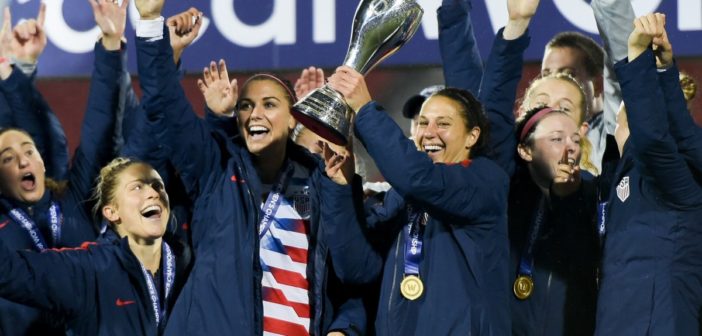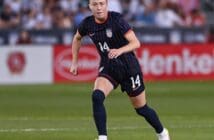The depths and/or limits of the American judicial system may escape me but the ruling from federal judge Gary Klausner, dismissing a substantial bulk of US Women’s case against US Soccer came with such a crushing inevitability over the weekend, you’d be forgiven for allowing yourself a shrug.
The ongoing suit had ridden to the forefront of women’s football around the world and hard allowed itself to become the marquee for the sport. The hissing beast of an issue about gender discrimination had been left to simmer and seethe during the Women’s World Cup last summer. The parting remark of, “see you in court,” fired forth by the team towards their bosses ahead of the tournament had coloured the World Cup in a different hue. The world became frenzied with Megan Rapinoe and a nothing feud with Trump; strange window dressing as the USA retained their crown in France.
Back on home soil after so many victory rounds, a ticker-tape parade and Supersoakers filled with suds, the suit began to pick up steam once more.
Those who cover women’s football in America began to lose their minds, hours spent pouring over legal documents beyond their pay grade. Page after page of legalese, adding layers to a case that was always fighting against a biased system. The depositions from earlier this year and fall out leading to Carlos Cordeiro’s resignation soured the federation in the public mind but added little legal precedent to the case.
There is a selection of Carli Lloyd’s deposition in here in which a U.S. Soccer attorney asked her about the #USWNT playing against U-16/U-18 boys NTs and the #USMNT and……. I’m just trying to imagine her reaction.
Carli is A, USSF attorney is Q. pic.twitter.com/Jhniraoko0
— Meg Linehan (@itsmeglinehan) February 21, 2020
US Soccer were playing as dirty as they could to leverage their claims that they hadn’t discriminated against the senior women’s team based on their gender and as the news began to drip through, the word “boycott” got thrown around. As with all things, it was the huge PR drive – a negative one – that effected change, namely Cordeiro’s early exit.
As so wonderfully worded by USWNT correspondent Caitlin Murry, Cordeiro’s downfall came from US Soccer’s, “Appalling admission in legal filings that the federation views its female athletes as inherently inferior to their male counterparts.”
The condemnation from fans and former players was swift – something US Soccer would undoubtedly have been able to live with – but when key sponsors (including Coca-Cola and Visa) showed their displeasure, the federation was forced to act. Cordeiro took his bow and Cindy Parlow Cone filled the vacant role, appeasing some, as the suit continued to role towards court – even with the talk of settling.
If you know this team at all you know we have a lot of fight left in us. We knew this wasn’t going to be easy, change never is. https://t.co/BfXqAAtCZ5
— Becky Sauerbrunn (@beckysauerbrunn) May 1, 2020
Here we find ourselves today, already in May with Klausner having thrown out the player’s case for unequal pay. The American law particular and narrow, the ruling not as surprising as some would have you believe but given the amount that the team’s CBA (collective bargaining agreement) has on the case, maybe nuance should bear more weight.
With the women’s and men’s CBA negotiated separately, a lot has been said about the specifics of what the women asked for without the context that female players lack the job security of their male counterparts.
The fragility and instability of women’s football – even in America – has led to overriding caution from players who have seen too many league and too many teams fold. This is a factor that seems to have been entirely overlooked.
consider the things the uswnt was asking for in addition to secure salaries: child care, health care, injury insurance, getting fringe players contract status/more money. these are the actions of a group that acutely knows what it is to be marginalized for your gender https://t.co/ciE0DhyvKa
— why did she take jesminder’s shoes?? (@thrace) May 2, 2020
So, the ruling was not a surprising one. The stories and reports of the news riddled with comment sections about the men’s team making more money was as predictable [and flawed]as ever.
The US players know the lawsuit is bigger than its constituent parts, it’s not just about the team that went to the World Cup, it’s not even just about women’s football but all of women’s struggle for equality in an inequality ridden world. The players have reminded everyone that they’ll keep fighting and this is a team that dug out a 123rd minute semi-final winner against Canada at 2012 Olympics. These are players that don’t know when they’re beaten and if the team doesn’t opt to settle, then who knows.
![Prost International [PINT]](https://prostinternational.com/wp-content/uploads/2021/08/PINTtFontLogoRoboto1536x78.jpg)



